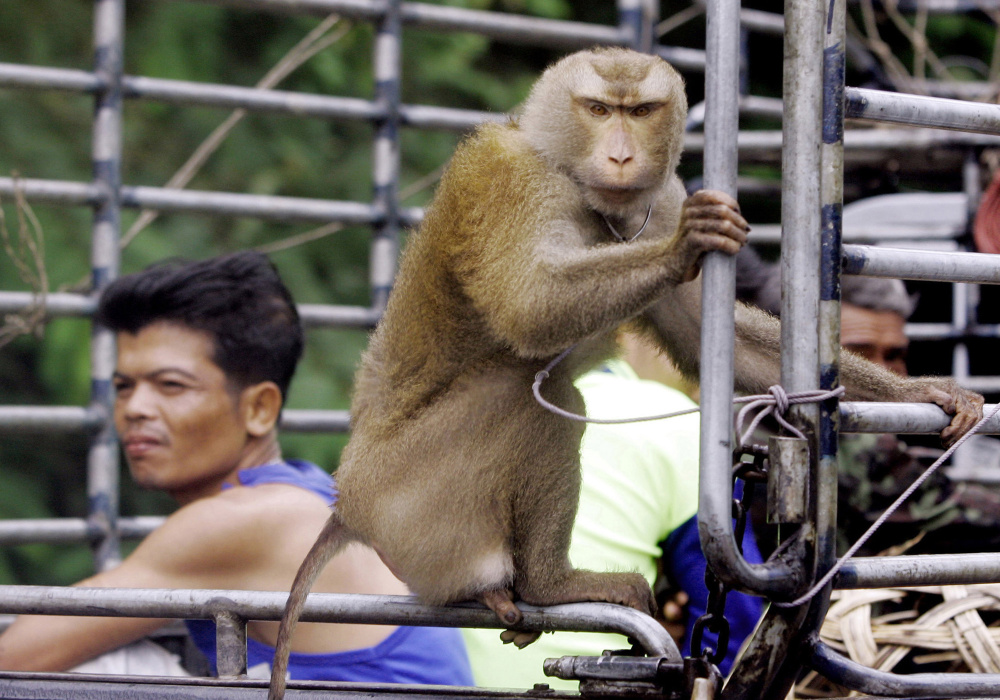If a creature is smart enough to pick coconuts, is it fair to make him? This is the question at the heart of a controversy over pigtailed macaques in Thailand that excel at picking coconuts loved by Western consumers – but do so on leashes.
“What I find most distressing is that they take them from wild, keep them tethered and keep them that way their whole life,” Marji Beach, education director of the California farm sanctuary Animal Place, told NPR. “Monkeys should stay in the wild.”
Leaving the deft-fingered macaques in the wild might deal quite the blow to the coconut biz. As NPR noted, males can harvest an average of 1,600 coconuts per day, while females can harvest 600. Compared with their less-evolved brethren, humans are real apes at this game, bringing home just 80 per day.
“It would be difficult to find a coconut product made in Thailand that wasn’t picked by a monkey,” Arjen Schroevers of the Monkey Training School in Surat Thani, Thailand, said.
On its website, the school, founded by Somporn Saekhow in 1957, bills itself as a monkey university – not a workhouse.
“As his parents were coconut farmers, Somporn experienced the traditional use of monkeys for the harvest of coconuts,” the website reads. “These monkeys were often beaten by their owners when they didn’t perform as expected (e.g. when they left ripe coconuts on the tree). This gave him the idea to teach monkeys in a better way. His Buddhist teacher encouraged him to teach monkeys positively, without the use of force or violence. In time, his school became locally famous, and the largest monkey school of all of southern Thailand.”
Indeed, in a documentary about the school shot in the 1990s, MTS seems like a bit of a monkey paradise. Saekhow handles a monkey less like a taskmaster than a father.
“Do it quickly, son, and when we finish this, you can go home,” he says to a charge. “The monkeys are innocent. If we beat them, it’s a sin.”
But, then again, there’s that leash – an obvious sign that monkeys may not be into the monkey business set before them by management. And while Saekhow may be enlightened, other schools may be less so. One described by the Bangkok Post last month talked up monkeys, more or less, as slave laborers.
“(Monkeys are) strong, enjoy climbing, are not afraid of heights, do not complain, do not call for higher wages … and are not corrupt,” the school’s website read. “They do not require social security and accident insurance. Monkeys are therefore considered a ‘living machine’ that is very valuable for coconut farmers.”
Perhaps this is the attitude that led Animal Place to contact dozens of coconut companies to quiz them on how they treated their monkeys.
“In some regions of the world, pig-tailed macaques are intentionally bred and trained – often with punishment – to harvest coconuts,” the farm’s website read. “The monkeys are always tethered to their ‘handler’ and are not permitted to eat the coconuts they collect”
Monkey mistreatment has also inspired debate on activist websites such as All American Vegan.
“Instead of living fulfilling, autonomous lives in deference to their natural instincts and will – lives that would include social interaction with others of their kind, mating, raising young, moving about freely and resting whenever they choose – these monkeys spend their lives in endless toil and forced obedience to the will of humans,” an article on the website read.
So, as an animal rights organization in the U.S. sues to protect the simian copyright of macaques taking “monkey selfies,” can the poor coconut-pickers be far behind?
Whether or not they prevail in court, the monkeys may be taking matters into their own hands – as PETA noted in 2009.
“A monkey in Thailand – fed up with performing the thankless task of climbing coconut trees to retrieve fruit for his owner to sell – apparently launched a coconut at the man’s head, killing him instantly,” the organization’s website read. “Did we mention that payback is hell?”
Copy the Story LinkSend questions/comments to the editors.



Success. Please wait for the page to reload. If the page does not reload within 5 seconds, please refresh the page.
Enter your email and password to access comments.
Hi, to comment on stories you must . This profile is in addition to your subscription and website login.
Already have a commenting profile? .
Invalid username/password.
Please check your email to confirm and complete your registration.
Only subscribers are eligible to post comments. Please subscribe or login first for digital access. Here’s why.
Use the form below to reset your password. When you've submitted your account email, we will send an email with a reset code.